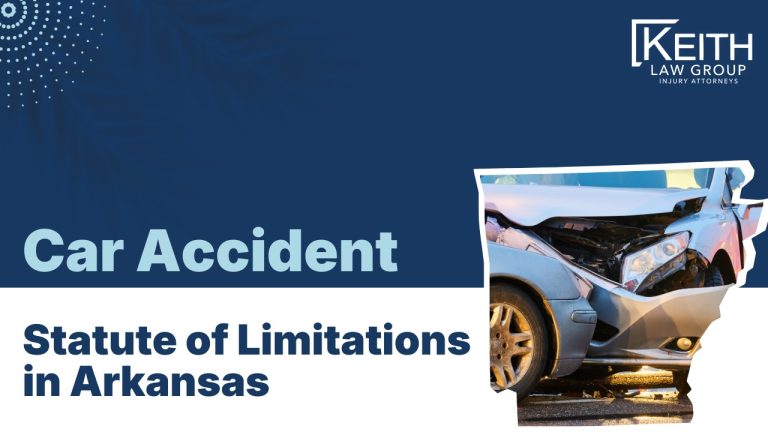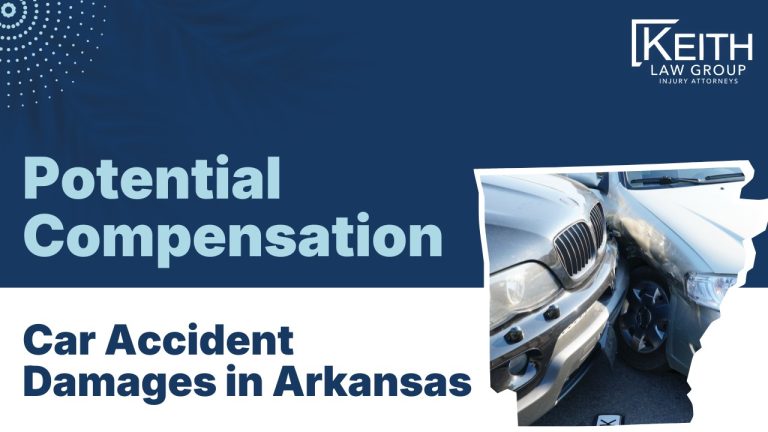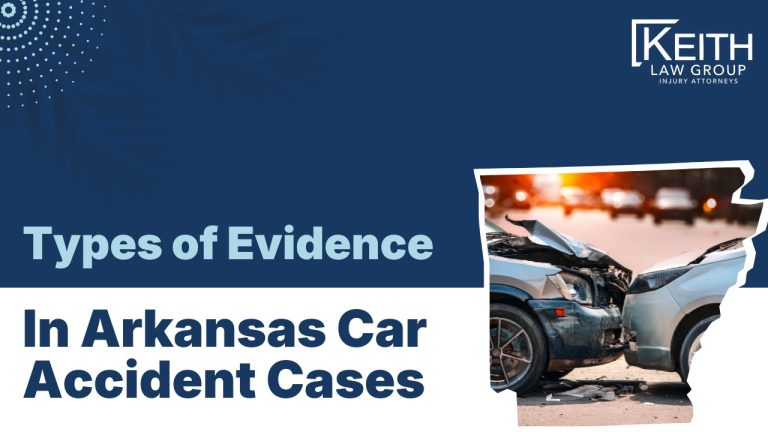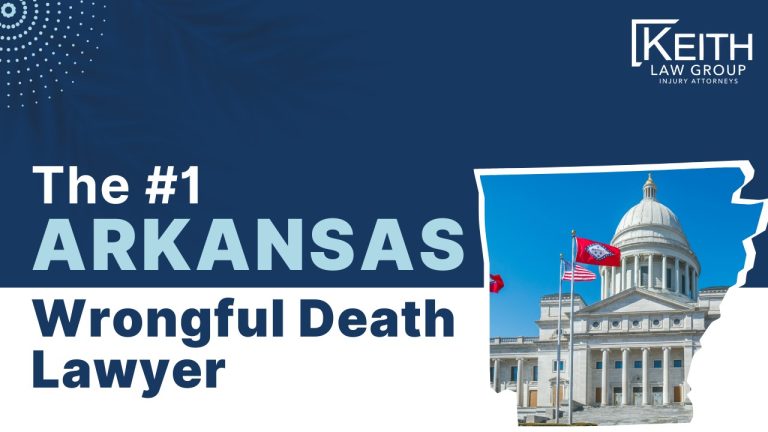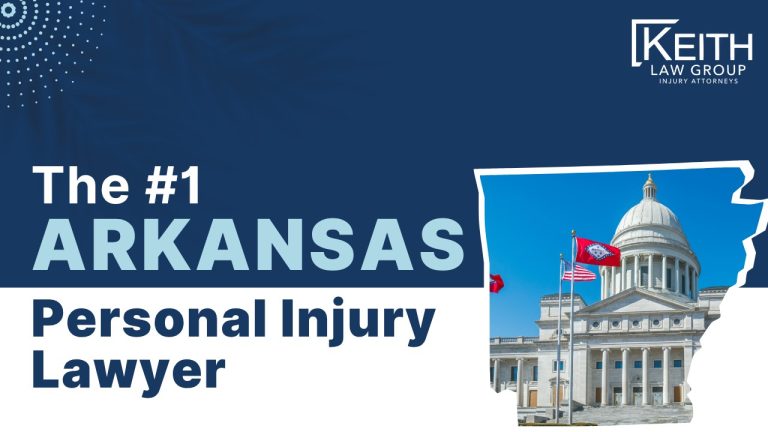- Last Updated: November 24th, 2025

Attorney Sean T. Keith has been a personal injury lawyer for 30+ years, a nationally recognized Top 100 Trial Lawyer, and top car accident lawyer & motor vehicle accident lawyer in Arkansas.
Legally Reviewed
This article has been written and reviewed for legal accuracy and clarity by the team of writers and attorneys at Keith Law Group and is as accurate as possible. This content should not be taken as legal advice from an attorney. If you would like to learn more about our owner and experienced injury lawyer, Sean T. Keith, you can do so here.
Fact-Checked
Keith Law Group does everything possible to make sure the information in this article is up to date and accurate. If you need specific legal advice about your case, contact us. This article should not be taken as advice from an attorney.
Sean Keith's Accollades & Practice Areas He Specializes In
- Over $20 Million recovered in Medical Device Injury Lawsuits.
- Over $13 Million recovered in Car Accident Lawsuits and other Motor Vehicle Accident Lawsuits.
- Over $100 Million recovered in total on behalf of clients.
- Sean represents clients in cases involving personal injuries, car accidents, motorcycle accidents, truck accidents, wrongful death, slip and falls, nursing home abuse cases, nursing home elopement cases, and more.
The Legal Process for a Wrongful Death Claim in Arkansas
When a family member’s death is caused by another party’s negligence or misconduct, the Arkansas wrongful death statute establishes the legal process for holding the responsible party accountable.
This law defines who qualifies to file a claim, what damages may be recovered by the estate and surviving family members, and the time limits for bringing legal action.
Knowing how the statute works is important for families seeking justice and rightful compensation for their deceased loved.
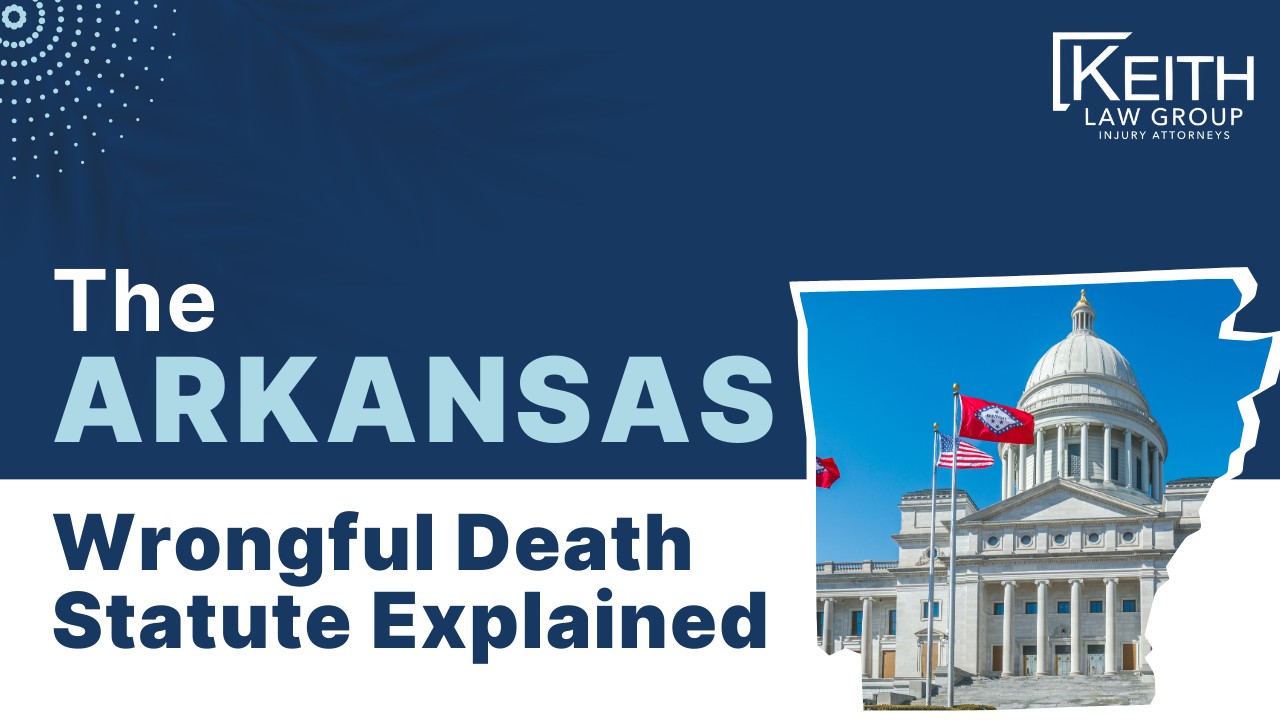
An Overview of Arkansas Wrongful Death Cases
When a death occurs because of another person’s negligence or wrongful act, the pain can feel both overwhelming and unjust.
In cases involving a fatal accident from incidents like a car accident, medical malpractice, or other preventable tragedies, Arkansas wrongful death lawsuits offer families the ability to seek compensation for the harm caused.
These claims are about accountability, truth, and honoring your loved one’s life while also protecting your family’s future security.
It is never only about the money.
Compensation cannot undo the loss or ease the weight of grief, but these claims are complex, and offer families a means for holding wrongdoers accountable.
Arkansas law allows recovery for medical expenses, funeral costs, lost income, and the personal suffering endured by loved ones.
Proving negligence requires careful analysis of evidence, expert testimony, and a clear legal strategy to establish how the death occurred and who is liable, the attorneys at Keith Law Group are here to help guide families through this difficult process.
This page provides details on eligibility for filing, what damages are available, and an overview of the legal process.
Understanding your rights under Arkansas law is an important first step in your consideration of taking legal action.
Contact Keith Law Group today for a free consultation with an Arkansas wrongful death statute.
You can also evaluate your claim instantly to see if you qualify for a wrongful death claim by using the chat feature on this page.
Table of Contents
A Quick Look at the Arkansas Wrongful Death Act
The Arkansas wrongful death statute creates a civil legal remedy when a person’s death is caused by another party’s negligence, recklessness, or intentional misconduct.
It allows the deceased person’s surviving family members or estate to bring a wrongful death claim for both economic and non-economic damages.
These may include expenses related to end-of-life arrangements, such as funeral or burial services.
Arkansas law treats the claim for wrongful death as a single, collective claim, with compensation distributed among eligible survivors rather than filed separately by each.
Arkansas law separates wrongful death into two distinct claims: the wrongful death action (on behalf of the family) and the survival action (on behalf of the estate).
The survival action addresses losses suffered by the deceased person before death — such as medical expenses, property damage, or conscious pain and suffering.
In contrast, the legal action for wrongful death compensates families for losses they have suffered due to the death.
Both claims may be filed together in a single lawsuit.
Together, these legal actions give Arkansas families a pathway to pursue compensation through civil court for both the immediate and lasting consequences of the death.
This legal structure ensures that Arkansas families are able to pursue full compensation without needing to navigate overlapping or duplicative lawsuits.
Who Can File a Wrongful Death Lawsuit in Arkansas?
Only certain individuals — most often family members or the estate’s personal representative — can file a wrongful death claim under Arkansas law.
Eligibility depends on the relationship to the deceased person and whether the claim is brought on behalf of the family or the estate.
The family claim compensates surviving loved ones for their own losses, while the estate claim addresses losses the deceased person suffered before death.
Compensation depends on the specific losses experienced by the claimant and may be shared among eligible survivors.
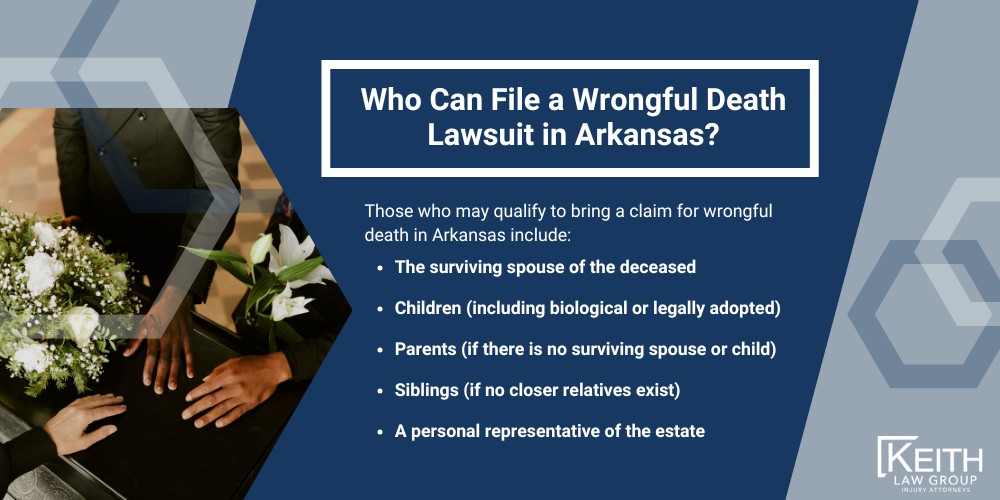
Those who may qualify to bring a claim for wrongful death in Arkansas include:
- The surviving spouse of the deceased
- Children (including biological or legally adopted)
- Parents (if there is no surviving spouse or child)
- Siblings (if no closer relatives exist)
- A personal representative of the estate (in cases involving survival actions or damages not pursued in the family’s wrongful death claim)
What is the Statute of Limitations in Arkansas for Wrongful Death Cases?
Most wrongful death claims in Arkansas must be filed within three years of the date the death occurred.
This statute of limitations applies to general negligence cases, including car accidents, unsafe premises, and other civil claims.
If the cause of death was medical malpractice, the deadline to file may be shorter — only two years from the date of the alleged act or omission.
If the deadline passes, the court will almost always dismiss the case, even if liability is clear.
Some exceptions may apply in limited circumstances, such as cases involving minors, fraudulent concealment, or delayed discovery of the cause of death.
Early legal guidance can help avoid missed deadlines and lost claims; the safest course is to speak with an attorney as soon as possible after the death occurs.
Do Wrongful Death Claims in Arkansas Have Damage Limits?
Arkansas does not limit economic damages in wrongful death claims, meaning survivors can recover the full value of lost income, medical bills, and funeral or burial expenses.
However, certain non-economic damages — such as grief, emotional distress, or loss of companionship — may be subject to statutory caps and families may receive less compensation.
These caps typically apply in medical malpractice cases and other civil claims where the legislature has imposed specific limits.
There is no cap on non-economic damages when the death resulted from criminal actions like a felonious killing.
Punitive damages are only awarded in rare cases involving intentional misconduct, fraud, or gross negligence, and may be subject to separate limitations.
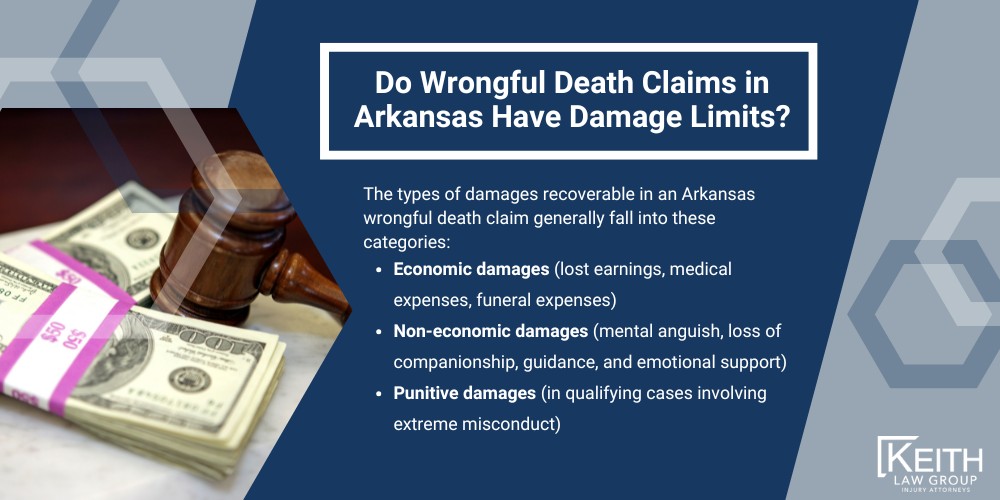
The types of damages recoverable in an Arkansas wrongful death claim generally fall into these categories:
- Economic damages (lost earnings, medical expenses, funeral expenses)
- Non-economic damages (mental anguish, loss of companionship, guidance, and emotional support)
- Punitive damages (in qualifying cases involving extreme misconduct)
An experienced attorney can evaluate whether any statutory limit could affect your specific claim.
These categories reflect both the measurable financial losses and the harder-to-quantify personal suffering endured by the family or the estate.
Keith Law Group is a trusted law firm that is here to help families evaluate how these limits may affect their financial recovery and whether exceptions apply.
Understanding When a Wrongful Death Claim Applies in Arkansas
A wrongful death claim may be filed in Arkansas when someone’s negligent, reckless, or intentional actions cause another person’s death.
These claims are civil, not criminal, and are based on personal injury law — if the deceased could have filed a personal injury claim had they lived, that right passes to their survivors.
The claim must prove that the defendant’s actions directly caused the death and resulted in compensable losses.
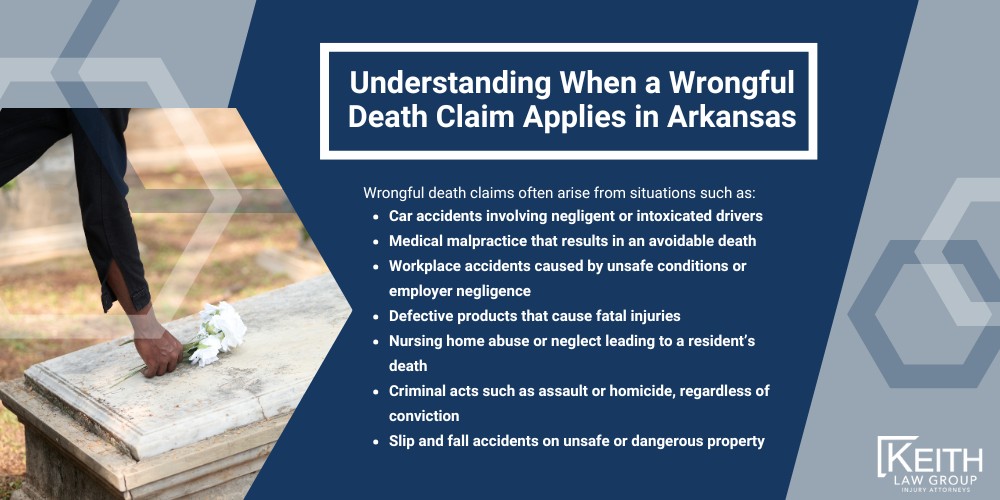
Wrongful death claims often arise from situations such as:
- Car accidents involving negligent or intoxicated drivers
- Medical malpractice that results in an avoidable death
- Workplace accidents caused by unsafe conditions or employer negligence
- Defective products that cause fatal injuries
- Nursing home abuse or neglect leading to a resident’s death
- Criminal acts such as assault or homicide, regardless of conviction
- Slip and fall accidents on unsafe or dangerous property
Arkansas law also recognizes a claim for the death of an unborn child, as long as it meets statutory definitions.
Not every death qualifies.
A lawful act that results in death, such as a permitted medical procedure, may not support a claim.
The facts of each case must be reviewed closely to determine whether Arkansas law allows a wrongful death lawsuit.
Survival Action vs. Wrongful Death Action
Arkansas law recognizes two separate — but often related — legal claims when a person dies due to negligence.
These are the wrongful death action (filed on behalf of surviving family members) and the survival action (brought by the estate of the deceased).
Though they arise from the same event, the two claims serve different legal purposes and compensate different types of harm.
A wrongful death lawsuit allows eligible family members to recover damages for both financial and emotional losses such as grief, loss of companionship, and funeral costs.
The survival action seeks damages the deceased could have claimed had they survived — such as pain and suffering, lost wages before death, or medical bills reflecting the value of the deceased person’s remaining life.
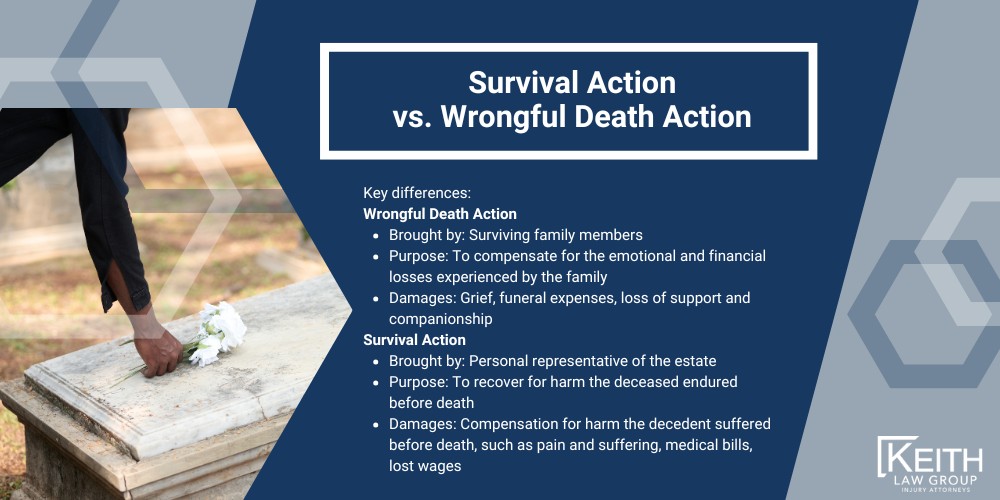
Key differences:
Wrongful Death Action
- Brought by: Surviving family members
- Purpose: To compensate for the emotional and financial losses experienced by the family
- Damages: Grief, funeral expenses, loss of support and companionship
Survival Action
- Brought by: Personal representative of the estate
- Purpose: To recover for harm the deceased endured before death
- Damages: Compensation for harm the decedent suffered before death, such as pain and suffering, medical bills, lost wages
These damages are awarded to the estate and are either distributed according to the will or, if no will exists, based on Arkansas’s default inheritance laws — known as intestate succession (see Arkansas Code § 28‑9‑214 for details on heir order).
Together, they reflect both the decedent’s loss and the family’s ongoing harm.
Do you Qualify for a Wrongful Death Claim?
Arkansas law only allows certain people to bring a wrongful death claim.
The personal representative of the deceased person’s estate has the primary right to file.
If no representative is appointed, specific family members may be allowed to bring the claim directly.
This includes individuals such as a spouse, child, parent, sibling, or anyone who stood in loco parentis (someone who acted as a parent) to the deceased.
Legal eligibility is based on state statute, not by personal closeness or emotional connection.

Speak with an Arkansas wrongful death lawyer to clarify your eligibility and for guidance through the legal steps involved in filing a claim.
Keith Law Group is here to help you.
For a free consultation, contact us or use the chat feature on this page to find out instantly if you qualify to file a wrongful death claim.
Evidence for Wrongful Death Claims
To support a wrongful death lawsuit in Arkansas, the claimant must present strong, clear evidence linking the defendant’s actions to the death.
Courts need documentation that connects the cause of death to the negligent or wrongful actions of another party.
Strong evidence can also demonstrate the financial and emotional impact on loved ones left behind.
Gathering this evidence early strengthens the case and prevents gaps that could undermine the claim.
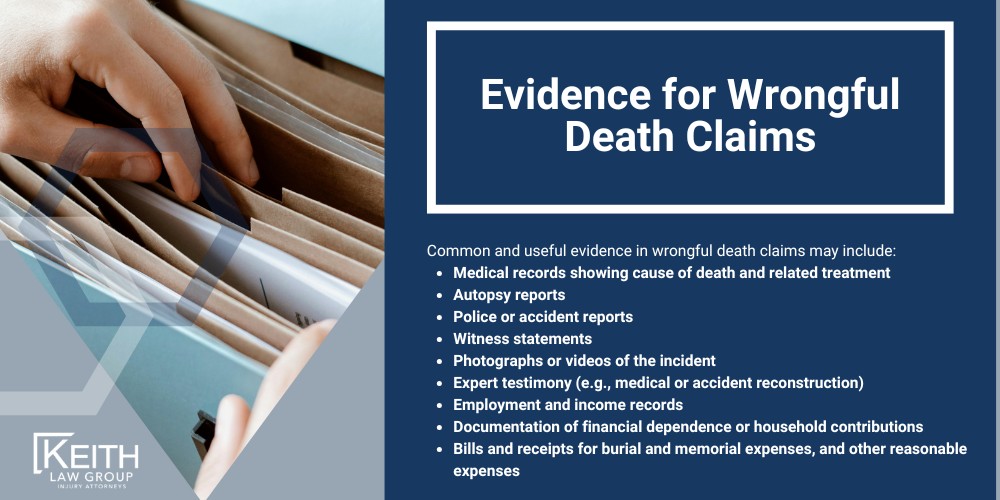
Common and useful evidence in wrongful death claims may include:
- Medical records showing cause of death and related treatment
- Autopsy reports
- Police or accident reports
- Witness statements
- Photographs or videos of the incident
- Expert testimony (e.g., medical or accident reconstruction)
- Employment and income records
- Documentation of financial dependence or household contributions
- Bills and receipts for burial and memorial expenses, and other reasonable expenses
Common Damages Awarded in Wrongful Death Claims
A wrongful death claim in Arkansas aims to provide financial relief to surviving family members for the losses caused by a loved one’s death.
Courts may award both economic and non-economic damages, depending on the details of the case.
Family members can recover for the personal impact of the death itself.
Damages are meant to support the family’s recovery—not to put a price on the life lost.
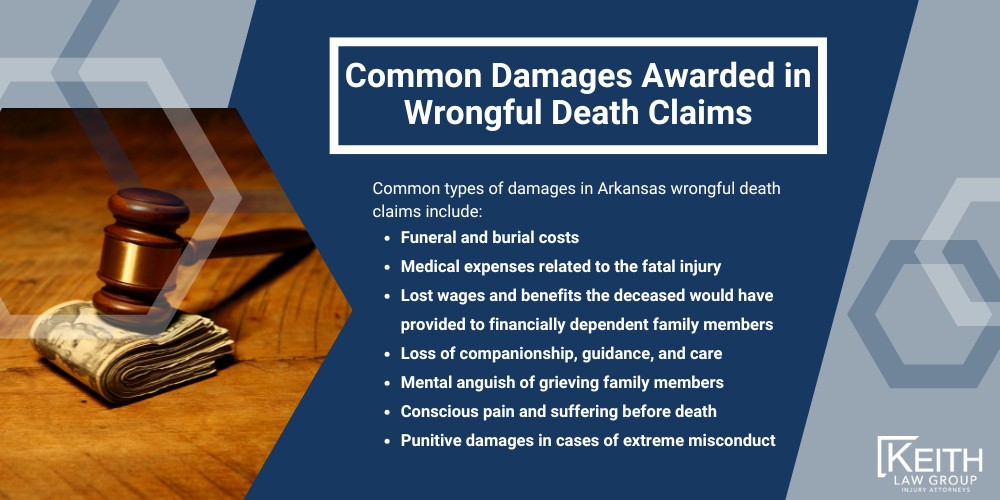
Common types of damages in Arkansas wrongful death claims include:
- Funeral and burial costs
- Medical expenses related to the fatal injury
- Lost wages and benefits the deceased would have provided to financially dependent family members
- Loss of companionship, guidance, and care
- Mental anguish of grieving family members
- Conscious pain and suffering before death
- Punitive damages in cases of extreme misconduct
Keith Law Group: Arkansas Wrongful Death Attorneys
You don’t have to face a wrongful death claim alone—and you don’t have to guess where to start.
Our compassionate team helps families understand their rights and what comes next.
We know how overwhelming and uncertain this process can be.
If you’re considering a wrongful death lawsuit in Arkansas, contact us for a free consultation.
We’re here to help you take the next step toward resolution and accountability.
Frequently Asked Questions
-
To succeed in a wrongful death claim in Arkansas, the claimant must show that the defendant’s negligent, reckless, or intentional actions directly caused the death.
This requires clear and persuasive evidence that ties the defendant’s conduct to the fatal incident and demonstrates how it resulted in measurable harm to the family or the estate.
Arkansas law does not require proof beyond a reasonable doubt like in cases regarding criminal charges.
Wrongful death claims are civil lawsuits, which means they follow the “preponderance of the evidence” standard.
In other words, you must prove that t is more likely than not that the defendant’s actions caused the death in such a claim.
To meet this burden of proof, the plaintiff must show:
- The defendant owed a duty of care to the deceased
- That duty was breached through negligence, recklessness, or intentional misconduct
- The breach directly caused the death
- The death resulted in monetary damages and emotional losses for the deceased person’s surviving spouse, eligible heirs or their estate
A wrongful death attorney can help gather and present the evidence to meet this burden and build a strong, fact-driven claim.
-
In Arkansas, the right to file a wrongful death claim typically belongs to the personal representative of the deceased person’s estate.
If no representative has been appointed, certain family members — such as a spouse, child, or parent — may be allowed to file the claim directly.
This structure can lead to situations where one party files a lawsuit without informing other family members.
That doesn’t necessarily mean they acted improperly; it may have been legally permissible under Arkansas law.
However, disputes can arise if multiple people believe they have a right to be involved.
If this has happened to you, a wrongful death attorney can evaluate your legal standing and advise you on your options.
Even if you didn’t file the claim yourself, you may still be entitled to share in any damages awarded.
-
It depends on the type of claim.
Arkansas law distinguishes between wrongful death actions (filed for the benefit of surviving family members) and survival actions (filed on behalf of the estate).
In most claims for wrongful death, the damages are paid directly to eligible family members and do not become part of the deceased person’s estate.
These damages are meant to compensate for personal losses like grief, financial support, and companionship.
In contrast, damages awarded through a survival action — such as medical bills, lost wages before death, and conscious pain and suffering — are considered part of the estate.
Those funds may be distributed according to the person’s will, or based on Arkansas’s intestate succession laws if no will exists (see Arkansas Code § 28‑9‑214 for details on heir order).
If you’re unsure how a claim was filed or how compensation may be divided, a qualified attorney can help clarify the situation and protect your interests.
Other Arkansas Practice Areas
You pay
nothing
unless we win
Do You Have A Case?
Other Arkansas Personal Injury Cases We Handle
Related Articles
Local Arkansas Resources
Education in Arkansas, Arkansas
- University of Arkansas at Little Rock
- University of Arkansas for Medical Sciences
- Arkansas Baptist College
- Philander Smith College
- Clinton School of Public Service
- Arkansas School for the Blind and Visually Impaired
- Arkansas School for the Deaf
- eStem Public Charter Schools
- LISA Academy
- Hall STEAM Magnet High School
- Little Rock Central High School
- Parkview Arts and Science Magnet High School
- J. A. Fair High School
- Little Rock Southwest High School
- Mills University Studies High School
- Joe T. Robinson High School
- Episcopal Collegiate School
- Catholic High School for Boys (Little Rock, Arkansas)
- Little Rock Christian Academy
- Mount St. Mary Academy (Little Rock, Arkansas)
- Pulaski Academy
Emergency Services in Arkansas, Arkansas
- Baptist Health Medical Center-Little Rock
- UAMS Medical Center
- CHI St. Vincent Infirmary
- Cornerstone Specialty Hospitals Little Rock
- Arkansas Children’s Hospital
- ACH West Little Rock Clinic
- ACH Southwest Little Rock Clinic
- City of Little Rock Police Department
- City of Little Rock Fire Department
- Mercy Hospital NW Arkansas
- Rogers City Police Department
- Benton County Sheriff’s Office
- Rogers Fire Department
- Washington Regional Medical Center
- Northwest Health Emergency Department
- Northwest Health Physicians’ Speciality Hospital
- Fayetteville Police Department
- Washington County Sheriff’s Office
- Fayetteville Fire Department
Courthouses near Arkansas, Arkansas
- City of Little Rock Criminal Court
- City of Little Rock Traffic Court
- City of Little Rock Environmental Court
- Pulaski Circuit/County Clerk
- Pulaski County District Court
- Richard Sheppard Arnold United States Courthouse
- District Court
- Benton County Clerk’s Office
- Fayetteville District Court
- Washington County Clerk’s Office
Arkansas, Arkansas Community & History
- Little Rock Central High School National Historic Site
- Big Dam Bridge
- William J. Clinton Presidential Library
- Arkansas State Capitol
- River Market District
- Junction Bridge
- Old State House Museum
- Simmons Bank Arena
- H.U. Lee International Gate and Garden
- Testament: The Little Rock Nine Monument
- Arkansas Governor’s Mansion
- Mount Holly Cemetery
- Little Rock Marathon
- Pops on the River
- Little Rock Main Street Food Truck Festival
- Big Dam Bridge 100
- World Cheese Dip Championship
- Arkansas State Fair
- Susan G. Komen Ozark More Than Pink Walk
- Arkansas Italian Food & Wine Festival
- Central Arkansas Pride Fest
- Six Bridges Book Festival
- Jewish Food & Cultural Festival
- International Greek Food Festival
- Wildwood Park for the Arts
- Central Arkansas Library System
- North Little Rock Public Library System
- North Little Rock Public Library
- Arkansas Foodbank
- Heifer Project International, Inc.
- EAST INITIATIVE
- Arkansas Search Dog Association Inc
- Storybook Project Of Arkansas Inc
- BRIDGE2RWANDA INC
- Women & Children First the Center Against Family Violence
- Bill Hillary & Chelsea Clinton Foundation
- Heifer International Foundation
- Literacy Action Of Central Arkansas
- Rescue Road
Top Rated Body Shops near Arkansas, Arkansas
- Service King West Little Rock
- Service King Downtown Little Rock
- Maaco Auto Body Shop & Painting: Little Rock Auto Body Shop
- McLarty Collision Centers (North & West)
- Golden Collision Center
- Northwest Arkansas Collision Center
- Old Town Auto Sales
- Bob Maloney Collision
- Fayetteville Collision Center
- Northwest Arkansas Collision Center
- Quality Collision Repair
Chiropractors near Arkansas, Arkansas
- Chiropractic Little Rock
- The Joint Chiropractic – Rodney Parham
- Little Rock Chiropractic Clinic, P.A.
- Warren Family Chiropractic
- New Hope Functional Chiropractic
- Unruh Chiropractic and Wellness Center
- Moore Chiropractic
- Thrive Wellness Center
- Millennium Chiropractic Sports Medicine & Rehab
- Wellness Center Chiropractic, Rehab & Massage
- Wellness Professionals Inc.

Choose Us For Your Personal Injury Case
- Available 24/7
- No Upfront Fees
- Free Case Evaluation
- No Fees Unless We Win!
